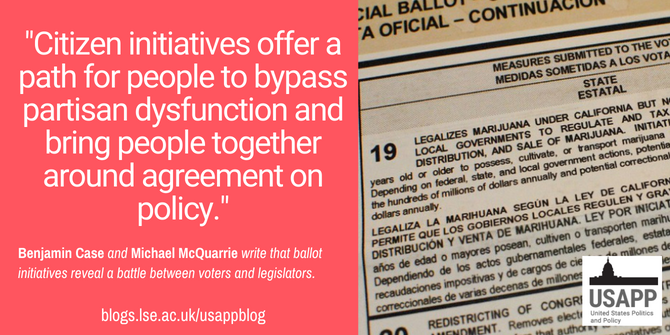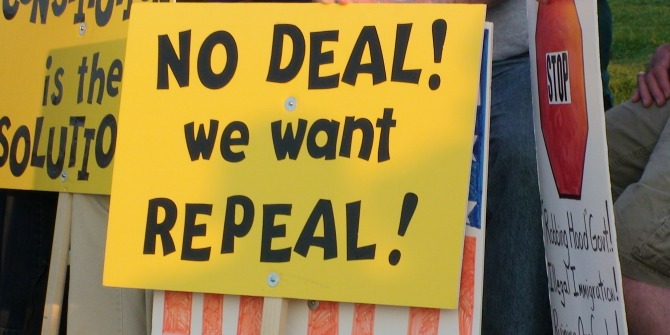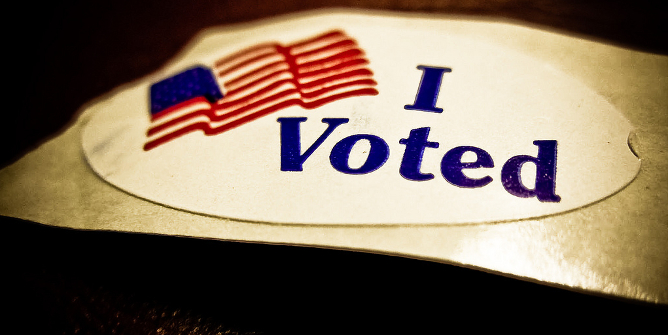
 In the past decade, voters have had remarkable success using citizen initiatives to directly pass egalitarian policies at the state level that would be unachievable through partisan legislation. Now elected representatives and judiciaries are fighting back against their own constituents. In new research, Benjamin Case and Michael McQuarrie examine the current fight over ballot initiatives – a crucial struggle for voter rights with deep implications for the future of the United States political system.
In the past decade, voters have had remarkable success using citizen initiatives to directly pass egalitarian policies at the state level that would be unachievable through partisan legislation. Now elected representatives and judiciaries are fighting back against their own constituents. In new research, Benjamin Case and Michael McQuarrie examine the current fight over ballot initiatives – a crucial struggle for voter rights with deep implications for the future of the United States political system.
Polarization: Rhetoric and Reality
Only days from the 2022 midterm elections, political polarization is at fever pitch. Legislatures are not producing policies that address the needs and aspirations of the working majority, and politicians are instead campaigning on negative messaging. Candidates from both parties are threatening catastrophe should the other side win. Through the partisan lens, the country appears divided down the middle, with reconciliation a fading prospect. Ballot initiative votes tell a different story.
Citizen initiatives are votes on policies rather than politicians. In half of US states and many municipalities, people can gather signatures to place a statute or constitutional amendment on the ballot.
The record of initiative votes in recent years shows that there is far more popular agreement on policy than partisan politics indicates. Voters in multiple states have been using citizen initiatives to pass policies that return wealth and decision-making power to working-class communities and increase rights and protections for the vulnerable. At the same time, legislators are working to take away citizens’ right to bypass their representatives using the initiative process.
Ballot Initiatives reveal the popularity of economically redistributive policies
Initiatives which make it onto the ballot that redistribute resources to poor, working-class, and middle-class households are particularly effective; in the past decade, they have won more than 75 percent of the time. Even as polarization appears to deepen, large majorities of voters in “red” and “blue” states alike are choosing to raise the minimum wage and, significantly in these inflationary times, peg the minimum to the cost of living; expand affordable medical care; tax the wealthy to fund public schools; curb debt collection on low-income and middle-class families, and more.
Minimum wage initiatives are the most striking example. Legislators have not raised the $7.25 federal minimum wage in 13 years, during which time inflation has eaten nearly a quarter of its value. However, since 2014, Alaska, Arizona, Arkansas, Colorado, Florida, Maine, Missouri, Nebraska, South Dakota, Washington, and Washington DC have all used citizen initiatives to win wage increases. In fact, there have been two dozen citizen initiatives to raise the minimum wage over the past quarter century, and every single one has passed – with an average of 60 percent of the vote.
Initiative votes often contradict votes for politicians in the very same election. In 2020, 51 percent of Florida voters chose Donald Trump, but 61 percent voted for a $15 minimum wage. When Arizona went to Trump in 2016, a million Arizonans voted for the Republican, but nearly 1.5 million voted for an initiative raising the wage floor and guaranteeing paid sick leave. Republicans are hostile to minimum wage increases, but voters, especially those from low-income communities, understand this issue in a different way than partisan identity. Minimum wage increases are the most resounding example, but we see similar outcomes for votes on a host of similar measures.

“California Ballot Prop 19” (CC BY 2.0) by brianc
Representatives versus the people
Rather than taking a cue from the wave of initiatives passing redistributive policies, elected representatives from both parties are working to undermine the initiative process. The Ballot Initiative Strategy Center has tracked more than 200 bills in state houses across the country in the past two years alone designed to curtail or kill citizen initiatives. Some are even referring referendums to voters designed to prevent future initiatives. In June, Republican legislators in South Dakota – a state where 80 percent of representatives are Republicans – referred a measure that would raise the winning threshold for future initiatives to 60 percent. It was their second such attempt in recent years, and voters rejected both.
Voters in Arizona are seeing three anti-initiative referendums on the November ballot, as well as a fourth designed to curtail voting rights in general. Democratic legislators in Colorado are referring a referendum that would make it more difficult for citizen initiatives to qualify for the vote. When legislators put referendums before voters that would curtail voter rights, they typically do so by appealing to partisan identities, but even so they seldom succeed.
Many attacks on citizen initiatives are more hidden. Legislators can change filing rules and timelines, and pass “strict compliance” laws that enable courts to kick initiatives off the ballot or invalidate them for any minor error. In Mississippi, opponents of a medical cannabis initiative that passed in 2020 sued after the win, arguing that the initiative had not gathered signatures from five congressional districts, as the constitution mandated. That amendment was written in 1992, however, and since then Mississippi had been reduced to four districts, meaning it was mathematically impossible to meet the criteria. The court sided with the plaintiff, effectively removing citizen initiatives from the books.
What’s next?
The US political system is in a downward spiral of polarization and dysfunction. Inequality has been rising for years, as quality of life declines for the majority. This trend has continued under both Republican and Democratic leadership. The less legislators can pass policies that address the majority’s material needs, the more politicians rely on demonizing the other party in order to win elections. The more polarized politicians from the two parties become, the less they are able to compromise on meaningful legislation, even when they want to.
Most analysts approach the current political turmoil in the US as a fight between Democrats and Republicans, but the fight over ballot initiatives reveals that there is a deeper struggle between voters and representatives who are not representing their interests. Citizen initiatives offer a path for people to bypass partisan dysfunction and bring people together around agreement on policy. Legislators are working to take away this right and preserve their monopoly on political decision-making.
The current rate of political polarization in the US is unsustainable. Confidence in the electoral system itself is eroding, and politicians are injecting more and more vitriol into the public sphere. If legislatures are successful in removing people’s ability to pass policies they need through formal structures, they will only open the door to more drastic forms of public action.
- This article is based on the report, ‘Majority Rules: The Battle for Ballot Initiatives’.
- Please read our comments policy before commenting.
- Note: This article gives the views of the author, and not the position of USAPP – American Politics and Policy, nor the London School of Economics.
- Shortened URL for this post: https://bit.ly/3FBedPv






